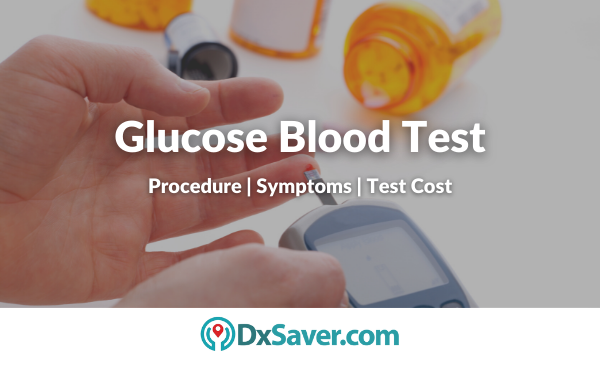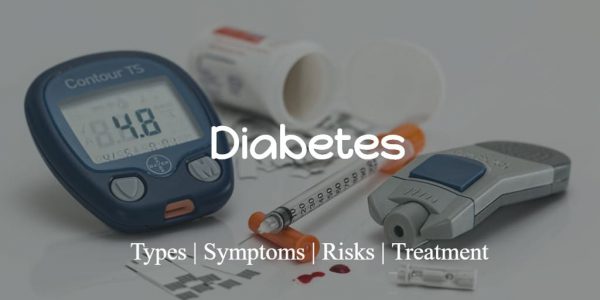
A glucose blood test measures the level of a type of sugar, called glucose in the blood. This test is used to determine if your blood sugar levels are in the healthy range. As diabetes can increase your blood glucose levels, a glucose blood test is done for people with type 1 & type 2 diabetes, and gestational diabetes. Usually, many people with diabetes need to check their blood glucose levels every day. So, if you have diabetes, make sure to talk to your health care provider about the best ways to manage your disease. Additionally, your doctor may order a glucose blood test if you have symptoms of high glucose levels (hyperglycemia) or low glucose levels (hypoglycemia).
This article covers all the significant topics related to the glucose blood test such as the test cost, symptoms, preparation for tests, risk factor, and how to get tested for a glucose blood test.
- What is a glucose blood test?
- Purpose of glucose blood test
- Symptoms of high/low glucose levels
- Who is at risk for developing diabetes?
- How should you prepare for this test?
- What happens during the glucose blood test?
- Risk of this test
- What do the results mean?
- Provider locations
For our readers who are interested in knowing the glucose blood test cost beforehand, we begin with that section.
How much does the glucose blood test cost?
Glucose blood test costs range from $28 to $46 in different labs and facilities across the US. Prior appointment isn’t required. You can order tests online by comparing the price or visiting the nearest lab during lab business hours. You will get the results in your email in 2 to 3 business days after completing the procedure. Apart from this, doctor consultation is available for any kind of further treatment or medical advice.
The table below shows the glucose blood test provider and their prices. You can know more and book the test by clicking on the “Book Now” button. All the labs are certified and offer a network across the US.
Name of our Partner Labs | Book Online at Offer Price |
HealthLabs
| $28 |
Personal Testing Lab
| $46 |
Glucose blood test cost with insurance
Many insurance companies in the U.S. cover all the vital tests like a glucose blood test. However, the coverage provided by private health insurance companies and national health insurance programs like Medicare varies widely. Most of the health insurance policies cover glucose blood test costs only once or twice a year and when your physician orders more than twice in a year, you should pay the test cost out of pocket. So, you are recommended to check if your health insurance policy covers the glucose blood test cost.
Our glucose blood testing providers do not accept any kind of health insurance policy. However, they can provide you with an itemized receipt containing all the details viz the name of the test, code of the test, and CPT code which is necessary for insurance reimbursement purposes.
What is a glucose blood test?
Glucose, a type of simple sugar is the main source of energy for the body. The body breaks down the food we eat into glucose and other substances. And the glucose goes into the bloodstream and a hormone called insulin helps bring glucose into the body’s cells. Usually, insulin controls the amount of sugar in your blood. When a person has diabetes, their body either does not make enough insulin or the insulin produced does not work properly. And it causes sugar to build up in the blood. However, high levels of blood sugar can lead to severe organ damage if left untreated.
A glucose blood test measures the level of glucose in your blood. Too much or too little glucose may indicate a serious medical condition. This test is used to screen for diabetes (high blood sugar) or hypoglycemia (low blood sugar). And it is also used to monitor your levels when you are already diagnosed with diabetes.
A glucose blood test is also called blood sugar, self-monitoring of blood glucose, fasting plasma glucose, fasting blood sugar, or fasting blood glucose.
Purpose of glucose blood test
A glucose blood test can be used to determine if your blood sugar levels are in the healthy range. Doctors may order glucose blood tests:
- To check for prediabetes and diabetes
- Monitor treatment of diabetes
- To check for diabetes that occurs during pregnancy or gestational diabetes
Additionally, your doctors may also order this test when you have symptoms of high glucose levels (hyperglycemia) or low glucose levels (hypoglycemia).
Symptoms
Symptoms of high blood glucose levels may include:
- Increased thirst
- More frequent urination
- Wounds that are slow to heal
- Headaches
- Trouble concentrating
- Blurred vision
- Fatigue
- Weight loss
- Blood sugar more than 180 mg/dL
Symptoms of low blood glucose levels may include:
- Anxiety
- Sweating
- Trembling
- Confusion
- Hunger
- Shakiness
- Pale skin
- Fast or irregular heartbeat
- Sleepiness
- Dizziness
- Crankiness

Who is at risk for developing diabetes?
Risk factor depends on the type of diabetes.
Risk factors of Type 1 diabetes may include:
- Family history of Type 1 diabetes
- Exposure to a viral illness
- Injury to the pancreas
- Presence of autoantibodies
- Physical stress like illness or surgery
Risk factors of prediabetes and Type 2 diabetes may include:
- Family history of Type 2 diabetes or prediabetes
- Being overweight
- Being age 45 or older
- Blood pressure over 140/90 millimeters of mercury
- Low HDL cholesterol and high triglyceride level
- Having polycystic ovary syndrome
- Having a history of stroke or heart disease
- Being a smoker
- Being physically inactive
- Having gestational diabetes
Risk factors of gestational diabetes may include:
- Family history of prediabetes or Type 2 diabetes
- Being overweight before your pregnancy
- Women older than age 25
- Gave birth to a baby weighing more than 9 pounds
How should you prepare a glucose blood test?
Blood glucose tests can be random or fasting tests. For this test, you should not consume food or beverages other than water eight hours before the test. You can eat or drink before a random glucose test. However, fasting tests provide more accurate results & are easier to interpret.
Make sure to tell your doctor about the medications you’re taking, including prescriptions, over-the-counter drugs, and herbal supplements before the test. Because certain medications can affect blood glucose levels. So, your doctor may ask you to stop taking a particular medication or to change the dosage before your test temporarily.
What happens during the glucose blood test?
For this test, the blood sample is most likely to be collected with a very simple prick to a finger. Or your doctor may also draw blood from a vein when you need other tests.
Before drawing blood, a nurse or healthcare professional will clean the area with an antiseptic to kill any germs. They will tie an elastic band around your upper arm, to make veins swell with blood. Once a vein is found, they will insert a sterile needle into it. And the blood is drawn into a tube attached to the needle. It is common to feel slight pain when the needle goes in. After drawing blood, your healthcare professional will remove the needle and place a bandage over the puncture site. Then the blood sample will be sent to a lab for testing.
Risk of this test
There is little risk in having a glucose blood test. You may have slight bleeding, bruising, minor pain, in the area where the needle was inserted. But the symptoms go away quickly.
What do the results mean?
Normal results
For a fasting test, a normal level is between 70 and 100 milligrams per deciliter (mg/dL). Whereas for a random blood glucose test, a normal level is under 125 mg/dL. It is important to note that, the exact level will depend on when you last ate.
Abnormal results
For a fasting blood glucose test, a blood glucose level of 100–125 mg/dL can indicate prediabetes. And when the blood glucose level is 126 mg/dL and higher it can indicate diabetes. For a random blood glucose test, the blood glucose level of 140–199 mg/dL can indicate prediabetes. And when your blood glucose level is 200 mg/dL and higher, it can indicate that you likely have diabetes. When your random blood glucose test results are abnormal, doctors may order a fasting blood glucose test to confirm the diagnosis or another test like an Hgba1c.
If the test results are not normal, it doesn’t necessarily mean you have a medical condition. Even high stress and certain medicines can also affect glucose levels. Apart from this, high glucose levels may also be a sign of kidney disease, hyperthyroidism, pancreatitis, or pancreatic cancer. And lower than normal glucose levels may be a sign of hypothyroidism, liver disease, or too much insulin or other diabetes medicine.
Provider locations
A glucose blood test can be done in any of the following locations by visiting the lab near you. To know the glucose blood test cost, refer to the first section of the article.
- Alabama
- Alaska
- Arizona
- Arkansas
- California
- Colorado
- Connecticut
- Delaware
- Florida
- Hawaii
- Georgia
- Idaho
- Illinois
- Indiana
- Iowa
- Kansas
- Kentucky
- Louisiana
- Maine
- Michigan
- Minnesota
- Mississippi
- Missouri
- Montana
- Nebraska
- Nevada
- New Hampshire
- New Mexico
- North Carolina
- North Dakota
- Oklahoma
- Oregon
- Pennsylvania
- Puerto Rico
- South Carolina
- South Dakota
- Tennessee
- Texas
- Utah
- Vermont
- Virginia
- Washington
- West Virginia
- Wisconsin
- Wyoming
Frequently Asked Questions
Will insurance cover my testing cost?
No, insurance will not be covered in the billing. However, they will provide you with a receipt for insurance reimbursement purposes.
How should I book my appointment?
You can choose the most suitable provider from above and make an appointment by following the instructions mentioned by them.
Can I cancel my lab test order?
Yes, you can cancel your lab test order any time before your testing. A refund will be initiated after deducting the cancellation fee. However, cancellation is at the discretion of the provider.
Do the providers offer result interpretations?
Yes, a few providers may provide doctor consultation who will take you through the results and provide clarification if needed.
How do I receive my report?
To ensure your privacy, the test report will be mailed to you by the provider.
Other topics you may also be interested in:-
- Bioidentical Hormone Test: Benefits, and Test Cost
- Statin Panel Blood Testing in the US
- Importance of hCG Qualitative Pregnancy Test
- What is a TSI Thyroid Test? – Purpose, and Procedure
- What is a Titer Test?
- Importance of Aldosterone to Renin Ratio
- At-Home HIV Test Cost in the U.S.
- What is MMA Fighter Blood Test?
- Importance of BNP Levels in Blood
- AST Blood Testing Cost in the US
- What is Ammonia in Blood?
- Causes and Symptoms of Zika Virus
- What is the Myasthenia Gravis Test?
- Symptoms of Ovulations and Testing Cost
- How much does Pancreatic Cancer Testing Cost in the US?






